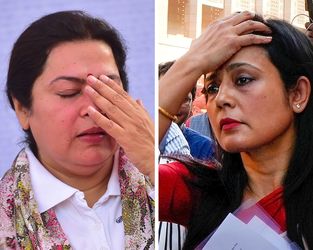Voltaire said, judge a man by his questions rather than by his answers. Mahua Moitra wouldn’t agree. She would want a person to be judged by her answers. Meenakshi Lekhi wouldn’t agree.
Both have reasons. Mahua thinks she has been harshly judged by her questions in Parliament; Meenakshi says she was wrongly judged by an answer she didn’t give in Parliament.
Meenakshi and Mahua are two of India’s most brilliant MPs, one an efficient minister, the other a dreaded debater. Their sins, alleged or real, aren’t similar. Mahua’s is mala fide; Meenakshi’s is lack of vigil.
Mahua tripped on questions. She shared her login ID and password (no big crime; most MPs lend them to aides) with a business house to post queries to ministries that would further its commercial interests (a crime). She is alleged to have got cash in return (a graver crime). Mahua says she didn’t, where’s the proof? Meenakshi tripped on answers. She found an answer tabled in her name which she hadn’t seen or signed.
Look trivial to us, but both are breaches of parliamentary sanctity—one by commission, the other by omission.
Question hour is Parliament’s most sacred hour, when the very ordinary backbencher gets to question the majesty of the most powerful minister, when every minister is held accountable to every elected member. No query is treated trivial, even when it is about what the government is doing to stop the Himalayas from growing.
The right to question the government in the house, even on matters of daily running, is the most envied as also the most dreaded aspect of the Westminster system. So much so George Bush Sr said, "I count my blessings for the fact I don't have to go into that pit that John Major stands in, nose-to-nose with the opposition, all yelling at each other." Yet, while running for president in 2008, John McCain promised to ask Congress, if he gets elected, “To grant me the privilege of coming before both houses to take questions, and address criticism, much the same as the prime minister of Great Britain” does. Thankfully, McCain didn’t make it.
Questions are of two kinds—those answered orally, and those to which written replies are given. Aides burn midnight bulbs in ministries during sessions, drafting detailed answers to scores of questions, and making huge ‘briefs’ for ministers to check while making oral replies.
Ministers dread oral queries. A questioner is allowed two sub-queries after listening to a minister’s answer. That’s where ministers get caught. Unless fully briefed, or having done proper homework, they could falter and fail the grill. Aides sitting in officers’ gallery can send quickly scribbled notes, but those are of little help unless the minister has studied the matter. Many a mighty minister has made a fool of himself, having come without doing his homework.
For us, this provides not just amusement, but also a treasure trove of information. Believe me, eliciting info through Parliament queries is faster, more efficient and more thorough than through RTI queries. Diligent newsmen, who wade through the ocean of data that are being tabled and filed in records, are known to have stumbled on many a news scoop. I, too, have.
Now for some comic relief. A member once asked the defence minister about the nationalities of militants who had been nabbed or killed in Jammu & Kashmir. The reply: it can’t be revealed in national interest. He sent the same query to the home minister. In a written reply, the minister gave the exact count of each nationality.
That much for national interest.
prasannan@theweek.in


